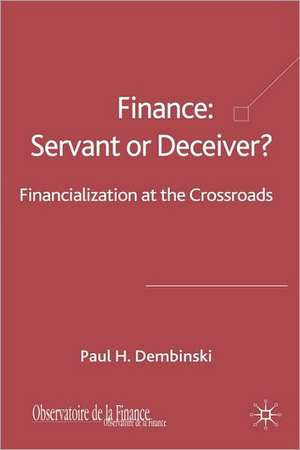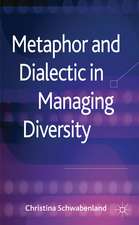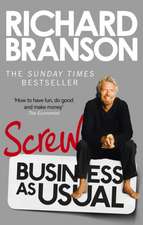Finance: Servant or Deceiver?: Financialization at the Crossroads
Autor P. Dembinskien Limba Engleză Hardback – 3 dec 2008
| Toate formatele și edițiile | Preț | Express |
|---|---|---|
| Paperback (1) | 381.81 lei 43-57 zile | |
| Palgrave Macmillan UK – 2009 | 381.81 lei 43-57 zile | |
| Hardback (1) | 385.84 lei 43-57 zile | |
| Palgrave Macmillan UK – 3 dec 2008 | 385.84 lei 43-57 zile |
Preț: 385.84 lei
Nou
Puncte Express: 579
Preț estimativ în valută:
73.83€ • 77.28$ • 61.45£
73.83€ • 77.28$ • 61.45£
Carte tipărită la comandă
Livrare economică 31 martie-14 aprilie
Preluare comenzi: 021 569.72.76
Specificații
ISBN-13: 9780230220379
ISBN-10: 0230220371
Pagini: 185
Ilustrații: X, 185 p.
Dimensiuni: 152 x 229 x 20 mm
Greutate: 0.36 kg
Ediția:2009
Editura: Palgrave Macmillan UK
Colecția Palgrave Macmillan
Locul publicării:London, United Kingdom
ISBN-10: 0230220371
Pagini: 185
Ilustrații: X, 185 p.
Dimensiuni: 152 x 229 x 20 mm
Greutate: 0.36 kg
Ediția:2009
Editura: Palgrave Macmillan UK
Colecția Palgrave Macmillan
Locul publicării:London, United Kingdom
Cuprins
Introduction PART I: THE FINANCIAL ICEBERG The Historical Development of Finance Players and Institutions The Financial World View PART II: A NEW PATTERN Financial Relationships and Financial Transactions The Spread of Transactions Very Large Corporations: The Vehicles of Financialization Financialization of the Economic Fabric Tying Customers to Businesses Other Aspects of Financialization Implication of the New Pattern PART III : FINANCE – WHAT KIND OF SOCIETY DO WE WANT? Limits Inherent in the Process Itself Limits Inherent in Human Nature What is to be Done? Bibliography Index
Recenzii
'Writing in September 2008, watching the financial markets drag the world into recession, the importance of this book is clear. It sets out convincingly the deceit of a financialised economy, driven by forces which betray. The authors understand the issues, and have spent years in preparation for this excellent book which permits a critical understanding of the forces which are so badly affecting us. It is not a simple polemic, nor wholesale condemnation but an ethically driven critique of the false path down which the western economies have traveled.'
- Rev Justin Welby, Dean of Liverpool Cathedral, UK, Personal and Ethical Adviser to the Association of Corporate Treasurers, and Member of the Committee of Reference F&C plc.
'Paul Dembinski is an economist who believes (as I do) that economics should be entertaining good special relations with the neighbouring disciplines of philosophy, psychology, sociology and anthropology. In this extraordinary essay, drawing on a decade of work of the Observatoire de la Finance, he provides a lucid, cutting-edge treatment of the present-day process of financialization of the global economy. The anatomy of the present-day financial-market model, carried along the lines of systemic approach, is followed by a disquieting analysis of its many pathologies, which jeopardize both the economic and the socio-political spheres.
With Paul Dembinski, finance once again becomes a humane activity where interpersonal relations and not mere transactions occupy the center of the stage. The Author provides illuminating and workable suggestions on what should be done in order to re-orient the present trend. Dembinski's well-written, jargon-free book will capture the attention of anyone seriously interested in the future of our civilization.'
- Stefano Zamagni, Professor of Economics, University of Bologna, Italy. Adjunct Professor of Political Economy, Johns Hopkins University, Bologna Center, Italy. Author (with L. Bruni) of Civil Economy (2007).
'Finance: Servant or Deceiver? by Paul H. Dembinski is a unique and powerful book. Rarely does a book contain a broad picture of humanity with such detailed and meticulous research. And rarely does an interdisciplinary theoretical book covering philosophy, economics, and psychology shock and alarm.
The author provides a structure to both the history of finance and its impact on global society. He leads the fascinated reader through the emergence of a new species of relationships and transactions, where actors play like marionettes in a world of financial market theater. The market's invisible hand is indeed invisible; but it is not the market's hand, but the hand of a few powerful leaders of aggregate wealth. Not their own wealth, mind you; but the wealth of others.
Professor Dembinski describes current human relationships, molded by the financial and market model: impersonal, short-term, calculating and mistrusting. Professor Dembinski invites the reader to abandon this model. The hearts of our economies, our relationships, our productivity, our values, do not belong to the financial model. Let us put this model in the place it deserves. Let those who preach it as the dominant model, and more importantly, those who follow it, read this book, and reconsider."
- Tamar Frankel, Professor of Law Boston University Law School, USA
Michaels Faculty Research Scholar, USA
Author of Trust and Honesty: America's Business Culture at a Crossroad(2006).
- Rev Justin Welby, Dean of Liverpool Cathedral, UK, Personal and Ethical Adviser to the Association of Corporate Treasurers, and Member of the Committee of Reference F&C plc.
'Paul Dembinski is an economist who believes (as I do) that economics should be entertaining good special relations with the neighbouring disciplines of philosophy, psychology, sociology and anthropology. In this extraordinary essay, drawing on a decade of work of the Observatoire de la Finance, he provides a lucid, cutting-edge treatment of the present-day process of financialization of the global economy. The anatomy of the present-day financial-market model, carried along the lines of systemic approach, is followed by a disquieting analysis of its many pathologies, which jeopardize both the economic and the socio-political spheres.
With Paul Dembinski, finance once again becomes a humane activity where interpersonal relations and not mere transactions occupy the center of the stage. The Author provides illuminating and workable suggestions on what should be done in order to re-orient the present trend. Dembinski's well-written, jargon-free book will capture the attention of anyone seriously interested in the future of our civilization.'
- Stefano Zamagni, Professor of Economics, University of Bologna, Italy. Adjunct Professor of Political Economy, Johns Hopkins University, Bologna Center, Italy. Author (with L. Bruni) of Civil Economy (2007).
'Finance: Servant or Deceiver? by Paul H. Dembinski is a unique and powerful book. Rarely does a book contain a broad picture of humanity with such detailed and meticulous research. And rarely does an interdisciplinary theoretical book covering philosophy, economics, and psychology shock and alarm.
The author provides a structure to both the history of finance and its impact on global society. He leads the fascinated reader through the emergence of a new species of relationships and transactions, where actors play like marionettes in a world of financial market theater. The market's invisible hand is indeed invisible; but it is not the market's hand, but the hand of a few powerful leaders of aggregate wealth. Not their own wealth, mind you; but the wealth of others.
Professor Dembinski describes current human relationships, molded by the financial and market model: impersonal, short-term, calculating and mistrusting. Professor Dembinski invites the reader to abandon this model. The hearts of our economies, our relationships, our productivity, our values, do not belong to the financial model. Let us put this model in the place it deserves. Let those who preach it as the dominant model, and more importantly, those who follow it, read this book, and reconsider."
- Tamar Frankel, Professor of Law Boston University Law School, USA
Michaels Faculty Research Scholar, USA
Author of Trust and Honesty: America's Business Culture at a Crossroad(2006).
Notă biografică
PAUL H. DEMBINSKI is a Professor at the University of Fribourg, Switzerland, and the Director of the Observatoire de la Finance in Geneva, Switzerland. He is founder and editor of the bilingual journal Finance& the Common Good/Bien Commun. He has written many books and scientific articles in the field of internationalization of enterprises, competition, ethics and finance.











